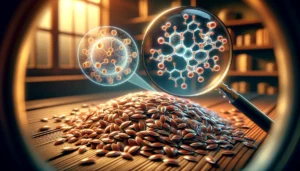The Anti-Cancer Power of Flaxseed for Cancer Prevention
Flaxseed for cancer prevention is gaining attention. This tiny seed is a potent ally in the fight against cancer. Packed with nutrients and bioactive compounds, flaxseed enhances our diet and health. This article reviews the science that supports flaxseed as a helpful addition in cancer prevention. We will explore how it disrupts cancer cell processes, improves hormonal balances, and boosts the body’s defenses against cancer.
The upcoming sections will detail studies showing flaxseed’s role in cancer care. We will look at its protein impact, the benefits of its lignans, and its effects on liver health and colorectal cancer. This guide explains why flaxseed deserves a place in your diet.
Let’s discover how flaxseed can lower cancer risks. We will see how it supports broader health goals, with insights from scientific studies and experts.
The Role of Flaxseed Proteins in Cancer Cell Dynamics
Flaxseed is more than just a dietary supplement; it’s a source of powerful proteins that actively combat cancer. These proteins include albumins, globulins, glutelins, and prolamins. Each plays a vital role in disrupting the lifecycle of cancer cells. Most notably, they help induce apoptosis, which is the process of programmed cell death critical in stopping cancer cells from multiplying.
A pivotal study published in Proteomes sheds light on these effects. It notes, “Flaxseed proteins are capable of modulating the signaling pathways that influence cell survival, suggesting their potential as a natural cancer therapy option.” This finding is crucial because it highlights the ability of these proteins to interfere with cancer cell survival and proliferation, providing a natural method for managing cancer risk.
By targeting these pathways, flaxseed proteins offer a promising avenue for cancer prevention. They not only halt the progress of existing cancer cells but may also prevent the formation of new cancer cells. This dual action makes it a valuable component of a cancer-preventive diet.
Flaxseed proteins are capable of modulating the signaling pathways that influence cell survival, suggesting their potential as a natural cancer therapy option.
Flaxseed and Breast Cancer: A Closer Look
Flaxseed is not only a nutrient powerhouse but also a significant player in breast cancer prevention. Its secret weapon? Lignans. These compounds, particularly secoisolariciresinol diglucoside (SDG), mimic estrogen but can act both as an antagonist and an agonist. This dual function allows them to bind to estrogen receptors, potentially reducing the growth of hormone-sensitive cancer cells.
A literature review published in Frontiers in Nutrition highlights this interaction. The authors discuss how the estrogen-like properties of lignans might impact breast cancer outcomes. They note, “…studies have shown that the intake of omega-3 fatty acids is related to the reduction of breast cancer risk.” This connection is vital because flaxseed is rich in omega-3 fatty acids, adding another layer of cancer protection.

Flaxseed’s Role in Colorectal Cancer Prevention
Flaxseed continues to show promise in the prevention of colorectal cancer due to its rich content of bioactive compounds such as lignans and fiber. These components are known for their antioxidant properties and their ability to interfere with cancer cell growth pathways, offering a strong defense against the development of colorectal cancer.
A comprehensive review in Current Oncology Reports provides insights into how it contributes to lowering colorectal cancer risk. The study highlights, “Consumption of flaxseed and its components contributes to a lower incidence of colorectal cancer through modulation of gut health and anti-inflammatory actions.” This statement underscores the significant role flaxseed can play in maintaining intestinal health and reducing inflammation, both of which are crucial for cancer prevention.
The mechanisms through which flaxseed operates include enhancing the body’s antioxidant defense system and disrupting the growth signals of cancer cells. By doing so, it not only helps prevent the initial stages of cancer development but also aids in stopping the progression of existing cancerous conditions.
Consumption of flaxseed and its components contributes to a lower incidence of colorectal cancer through modulation of gut health and anti-inflammatory actions.
Flaxseed’s Influence on Liver Health and Cancer Risk
Flaxseed’s benefits extend beyond the digestive tract, significantly impacting liver health and reducing the risk of liver-related cancers. This is particularly important given the liver’s critical role in detoxifying harmful substances and processing nutrients, which can influence cancer development.
Research published in Metabolites explores how flaxseed modifies liver metabolism. The study reports, “Flaxseed alters hepatic bioenergetic landscapes, which may contribute to its protective effects against cancer development.” This adjustment in the liver’s bioenergetic processes suggests that flaxseed can enhance liver function, helping to prevent the onset of cancerous conditions in this vital organ.
The interaction between flaxseed components and liver metabolism involves several key mechanisms. Flaxseed aids in optimizing energy use within liver cells, potentially reducing the likelihood of abnormal cell growth. Additionally, its nutritional components, such as omega-3 fatty acids and lignans, contribute to this protective effect by supporting overall liver health and stability.
Flaxseed aids in optimizing energy use within liver cells, potentially reducing the likelihood of abnormal cell growth.
Flaxseed Lignan Derivatives and Their Effects on Leukemia
The anti-cancer properties of flaxseed extend to its impact on leukemia, particularly acute myeloid leukemia (AML), a challenging cancer type due to its aggressive nature. Flaxseed lignan derivatives, notably effective in this context, have shown significant potential in targeting and combating AML cells.
A study detailed in Biomedicine and Pharmacotherapy highlights the effectiveness of these lignan derivatives. Researchers found that flaxseed lignan derivatives could significantly inhibit the growth and induce apoptosis in various AML cell lines. One researcher emphasized, “These findings support the potential of flaxseed as a therapeutic food component that can fight against certain cancers.”
This research points to the mechanisms through which lignans influence cancer cells, particularly their ability to initiate programmed cell death and prevent the proliferation of cancer cells. These findings are promising for the development of less toxic therapeutic options in cancer treatment, aligning with the growing interest in natural and dietary interventions.
Final Thoughts
Throughout this exploration, we’ve seen the broad benefits of flaxseed in cancer prevention and treatment. It boasts protein that triggers cancer cell death and lignans that impact hormonal interactions. Reviewed studies show flaxseed’s role in fighting breast, colorectal, liver, and leukemia cancers. It enhances our health defenses with a natural approach to cancer prevention.
Despite promising results, more clinical trials are needed. These studies are essential to confirm flaxseed’s effectiveness and potential integration into cancer treatment, particularly in personalized medicine.
Including flaxseed in our diets could be a simple, powerful step toward healthier lives and effective cancer prevention. As research continues, the role of flaxseed in improving public health and fighting cancer becomes clearer. Let this guide inspire those looking to enrich their diet and healthcare professionals exploring natural cancer therapies. Here, we have a promising ally in our fight against cancer.
References:
- Anti-Cancer Properties of Flaxseed Proteome. Proteomes
- The Effect of Flaxseed in Breast Cancer: A Literature Review. Frontiers in Nutrition
- Flaxseed Bioactive Compounds and Colorectal Cancer Prevention. Current Oncology Reports
- Flaxseed Reduces Cancer Risk by Altering Bioenergetic Pathways in Liver. Metabolites
- The anti-cancer effect of flaxseed lignan derivatives on different acute myeloid leukemia cancer cells. Biomedicine & Pharmacotherapy
A Note to Commercial Bakeries

- You can easily produce delicious flax-based keto-friendly products which are clean label, high protein, high fiber and plant-based!
- Recipes provided on all bulk orders, with ongoing customer support
- Worldwide shipping
- To order, visit our wholesale distributor, SnowCap Enterprises, and search: Powerflax Gold Low Carb Mix (SNC80).
- Get in touch with us!

